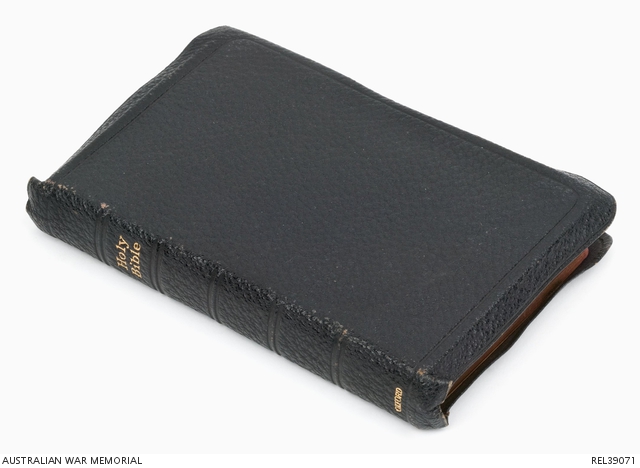| Places | |
|---|---|
| Accession Number | REL39071 |
| Collection type | Heraldry |
| Object type | Heraldry |
| Physical description | Leather, Paper |
| Location | Main Bld: First World War Gallery: Australia Goes To War: The ANMEF |
| Maker |
Oxford University Press |
| Date made | c 1914 |
| Conflict |
First World War, 1914-1918 |
Bible : Private H L Henley, Australian Naval and Military Expeditionary Force



Leather-bound bible with inscription on the flyleaf written by Mrs Charlotte Henley 'H.L. Henley "Tudor House" College Street Drummoyne Sydney 17.8.14/ To dear Leslie From mother with best wishes for his present and eternal welfare/ In all the ways acknowledge Him and He shall direct thy paths Prov 3 chap 6'. The end paper bears the same name and address. Pages 608-609 have been annotated in ink by Private Henley 'pages kissed by the three German prisoners (captains of the vessels captured by the Nusa) when taking oath of neutrality 27[sic]/10/14'.
This bible was presented to Private Harold Leslie Henley by his mother, Charlotte, on 17 August 1914, two days before he sailed for service in Rabaul, with A Company, 1 (Tropical) Battalion of the Australian Naval and Military Expeditionary Force (ANMEF).
Henley was a 20 year old law student at the University of Sydney when he enlisted as a private for service with the ANMEF on 13 August 1914. Six days later he sailed with his unit to take possession of German New Guinea and the surrounding Islands of the Bismark Archipelago aboard HMAT A35 Berrima. The initial Australian landings occurred on 11 September at Kabakaul in New Britain.
The following month Henley was among a group of fifteen soldiers sent to New Ireland aboard the captured German steamer Nusa to effect the release of the British consul there, to demand the surrender of the German District Officer and to locate the German steamer Siar, suspected of smuggling goods and supplies. All three objectives were achieved and a further two German motor schooners were captured, the Matupi and the Senta.
A formal surrender to the Australians was made on 17 October 1914. Henley's bible was used to take their oath of neutrality, the pages 608-609 were kissed by the three ship's captains during the ceremony. Henley later annotated these pages, mistaking the actual date of the ceremony, in ink, as follows: 'pages kissed by the three German prisoners (captains of the vessels captured by the Nusa) when taking the oath of neutrality 27[sic]/10/14'.
Henley was discharged from the ANMEF in early March 1915 and immediately enlisted in the AIF. He was commissioned as a second lieutenant and embarked from Sydney with the 7th reinforcements of the 13th Battalion aboard HMAT A9 Shropshire on 20 August 1915.
He joined his battalion on Gallipoli at the end of October and was posted to B Company. He was evacuated with the battalion via Mudros to Egypt at the end of December. After further training in Egypt, Henley was promoted to captain in March 1916 and he took command of B Company. 13 Battalion arrived in France in June.
The Battalion began moving into the line at Sausage Valley in early August and from the afternoon of 10 August, the men were fighting in the front line at Pozieres. They took part in their first major offensive at Mouquet Farm on 15 August, with Henley leading B Company forward to their objectives. The German artillery fire was intense and forced the battalion to retire. Henley made sure his men retired in small groups and in good order. He was the last to leave the trench and as he did, he was shot through one of his legs.
As he bent down to untie his puttee to use as a bandage, a shell went off behind him, peppering his back with shrapnel. Two of his fellow officers returned to find him and realising he was mortally wounded, stayed with him until he died. Henley had been a popular officer and his loss was felt keenly by his men.
Captain Henley's body was unable to be recovered and he is commemorated in the Memorial at Villers Bretonneux in France. He carried this Bible throughout his service and it was among his effects that were returned to his parents in Sydney after his death.